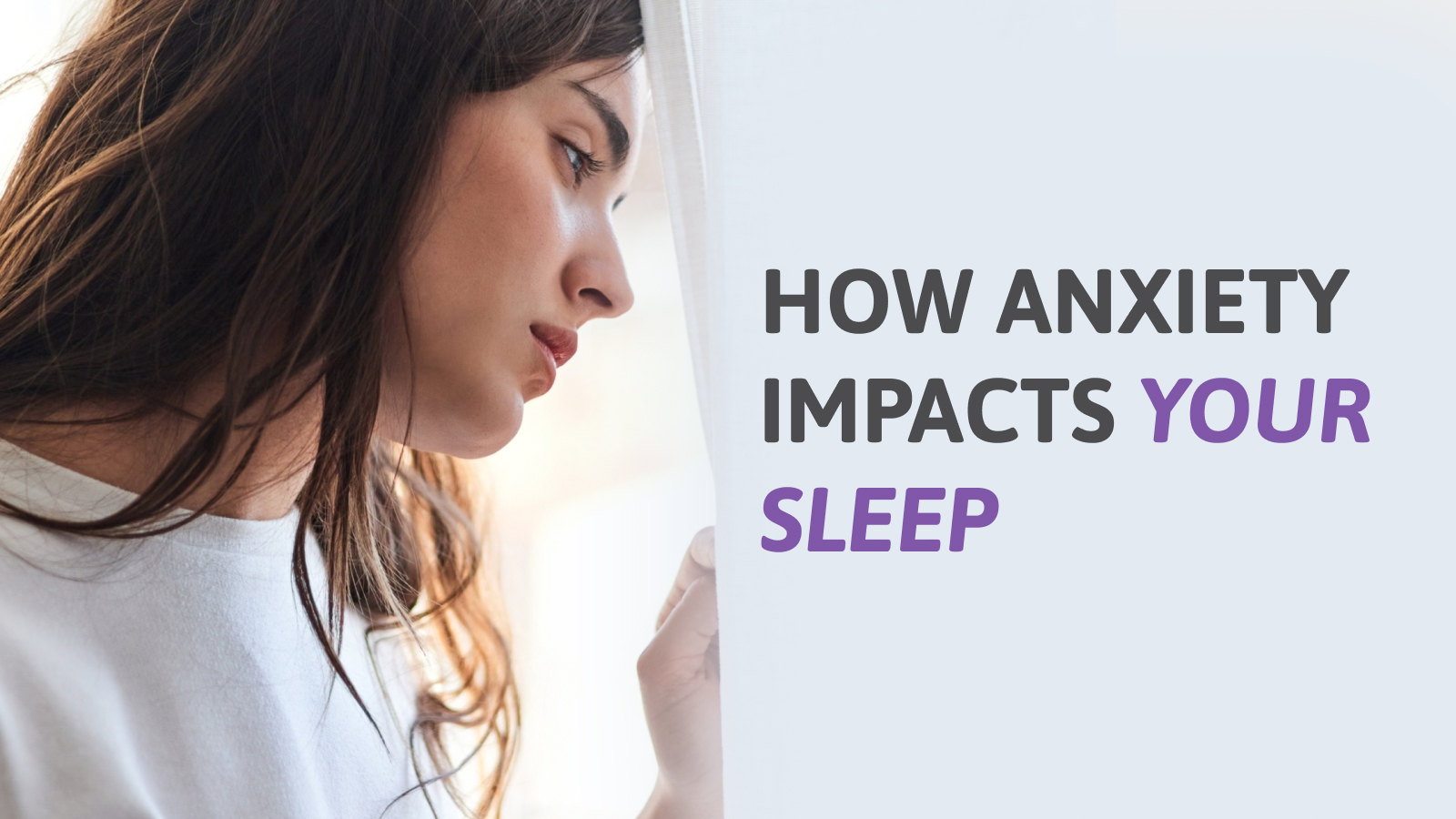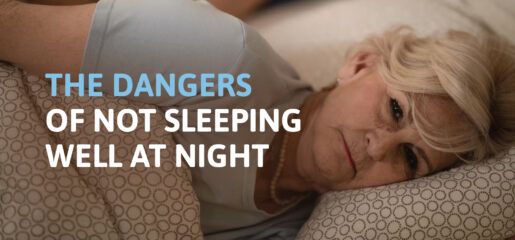
Experiencing occasional anxiety is a normal part of life, but when it starts to encroach on daily activities, like sleep, then it starts to become a problem. Anxiety left unchecked can have a huge impact on your ability to get good rest, but we’ve seen that a lot of people really undercut how much of an impact anxiety can have on your regular sleep.
Let’s take a look at some of the specific impacts anxiety has on the quality of your sleep, as well as some tips on how you can manage anxiety better to get the rest you need.
Anxiety Can Cause Insomnia or Make It Worse
Chronic anxiety can create symptoms of insomnia, and it can make existing insomnia symptoms worse. For example, among military veterans that have post-traumatic stress disorder (PTSD), 90% reported having at least some common symptoms of insomnia.
A 2019 study showed that patients that had symptoms of insomnia and anxiety experienced more severe sleep issues than just having insomnia alone, and the study encouraged doctors that were treating insomnia to also consider psychiatric comorbidities.
Research is clear that anxiety has a profound impact on your ability to sleep, with varying anxiety disorders often being at the core of why people struggle with insomnia.
Anxiety Can Affect Rapid Eye Movement (REM)
Chronic anxiety can also directly impact rapid eye movement (or REM). REM is one of the several stages of sleep that occur during a normal sleep cycle. When we enter REM sleep, your eyes begin to move quickly, and this is generally the stage of sleep where dreams are most likely to occur.
Anxiety can impact the REM stage of sleep, which can make nightmares and sleep disruptions more likely. In fact, this is generally what happens with those that have PTSD, and why it can be such a pervasive sleep problem.
Chronic Problems with Sleep Can Cause Sleep Anxiety
Whether you struggle with consistent nightmares due to anxiety or have consistent problems falling asleep and staying asleep, you can develop what’s called sleep anxiety. Sleep anxiety, as you might expect, is when you have anxiety specifically about falling asleep. You may be afraid of the nightmares you’ve been having, or you’re just afraid that you won’t be able to sleep.
Yes, anxiety about sleeping can make it hard to get good sleep, just like any other form of persistent anxiety.
Lack of Sleep Can Make Anxiety Worse
Anxiety and sleep have a bidirectional relationship, which means that anxiety can cause poor sleep, but poor sleep can make anxiety worse, creating a negative feedback loop. This can create a cycle that is difficult to get out of, because getting better sleep would improve anxiety symptoms, but you may struggle to get good sleep because of the anxiety symptoms.
The longer the cycle goes on, the worse your anxiety symptoms can become, and the harder it can be to get the sleep you need.
How to Manage Anxiety and Get Better Sleep
Addressing anxiety is key for many people to get quality sleep, but consistently finding a way to keep anxiety soothed is challenging. The sleep experts at PhenoLife have gathered four, researched-backed tips you can follow to help calm your anxiety and enjoy better sleep.
Cognitive Behavioral Therapy (CBT)
Cognitive behavioral therapy (or talk therapy, or counseling) is a style of therapy that specifically seeks to address toxic thinking that causes unwanted behaviors or moods. CBT is often used to treat anxiety and depression, since both of these mental health challenges are often rooted in unwanted thinking that results in unwanted behavior.
CBT is the therapy style that has the most research to support its efficacy, so if you’re struggling with anxiety, want to avoid prescription medications, and have access to mental health care, then CBT is a great place to start treating your anxiety.
Traditional Antidepressants
Along with therapy, you may want to try traditional antidepressants. Research suggests that they can be effective, especially when used in conjunction with therapy. However, traditional antidepressants can bring about unwanted side-effects, and sometimes a side-effect of antidepressants is insomnia.
Any decision about taking antidepressants should be made under the care of a doctor or psychiatrist, and if you can’t tolerate the side-effects (or the side-effects are causing the problem you’re trying to resolve), then you should talk to your doctor about changing medications or looking to other possible solutions.
High-Intensity Exercise
Exercise does more than just keep your body healthy. It can play an important role in managing anxiety, too. These studies primarily focused on aerobic exercise (like running), and found that high-intensity sessions brought better relief to anxiety than low-intensity sessions.
You should talk to your doctor before beginning an intense exercise regimen, but if you’re looking for an option to help soothe anxiety that isn’t medication and is often free or low-cost, then consider adding high-intensity exercise into your normal routine.
Try CBD
CBD, which is short for cannabidiol, is a compound naturally found in hemp. CBD is legal in most countries (though it’s only been legal for a few years). The early research of CBD is very promising, especially regarding how it can help manage anxiety.
A 2022 study showed that CBD could be a tool to address chronic anxiety issues, with little to no side-effects, even when used in conjunction with other treatments. The study emphasized that CBD showed the best effectiveness when paired with therapy, but also emphasized that the CBD needed to be legally sourced and pure.
If you’re thinking about trying CBD, you should talk to your doctor, since it can interact with certain kinds of prescription medication. However, if you’re looking for a largely safe tool, with minimal side-effects, and research-backed efficacy, then you may want to consider looking to CBD for anxiety help.
How to Use CBD for Anxiety
If you’re interested in using CBD for anxiety (and you’ve talked with your doctor), then we’re here to help! CBD is our specialty, and the experts here at PhenoLife know the best ways to take CBD in order to get the best benefits.
Determine Which Form of CBD is Best
You can take CBD in several different forms, and each form has its own pros and cons:
- Transdermal CBD patches: Transdermal CBD patches are applied to the skin, where CBD is absorbed through the skin into the bloodstream. This form of CBD offers sustained relief (lasting 8+ hours), which is ideal for managing anxiety over long periods of time without needing to take another dose.
- CBD Capsules: CBD capsules are taken just like a normal pill or supplement (just swallow it with water). They also offer sustained relief (as long as their bioavailability rates are high), and if you don’t like having a patch on your skin, a CBD capsule may prove to be a more convenient alternative.
- Inhale CBD: Inhaled CBD (or vaping CBD) is taken through a vaporizer device. A battery powers a heating element, heating up CBD oil, creating a vapor that you then inhale. This form of CBD is fast-acting, which makes it ideal for getting extra strong doses quickly if you are trying to fall asleep (or are experiencing an acute anxiety episode)
Consider Combining CBD Options
You don’t have to choose just one CBD form. You can combine them for better effects. For example, you can use inhaled CBD to get quick relief, and then use a transdermal patch to keep that relief sustained.
Consider a Targeted Formula
CBD can also come in catered formulas that are designed to target specific challenges. For example, PhenoLife has a Mind formula that uses CBD and CBG (another cannabinoid) to give more potent anxiety-relieving effects.
If you use our PhenoPatch, it’s made with ashwagandha, an herb that research suggests may help calm anxiety.
If you know that anxiety is the issue, then you may want to consider a formula specifically designed to target and relieve anxiety.
Choose a Reputable Brand
As we noted from the provided research, CBD products are only effective if they actually contain CBD and are pure and safe. Since CBD is largely unregulated in most countries, you’ll have to make sure that a brand provides a Certificate of Analysis that shows their products to be pure and safe.
Keep in mind that not all CBD products are able to be lab-tested. For example, you won’t find lab tests of transdermal patches.
Take CBD Everyday
It can take time to get the full benefits of CBD, so it’s extremely important to take it every day. We tell our customers to take a CBD product consistently for at least 3-5 weeks before trying a different form of CBD or a different formula.
Adjust Dosage as Needed
Finally, it’s not uncommon to tweak your dosage as you take CBD. We recommend starting with low doses and increasing those doses after a few weeks to make sure you can avoid mild-side effects.
Anxiety, Sleep, and CBD
Anxiety can be a huge problem for sleep. It can rob you of the rest you need, it can make nightmares more common, and anxiety and lack of sleep can feed into each other. Fortunately, there are several things you can do to combat anxiety, including:
- Therapy (specifically cognitive behavioral therapy)
- Traditional antidepressants
- High-intensity exercise
- Trying CBD
If you think you want to try CBD, then we’d love to help! We’re happy to answer any questions you may have about CBD in general or our products, and you can ask us through our web form. If you’re ready to start shopping, you can take a look at the products we offer in our store, though if anxiety is your main concern, we recommend taking a look at our Mind products.

